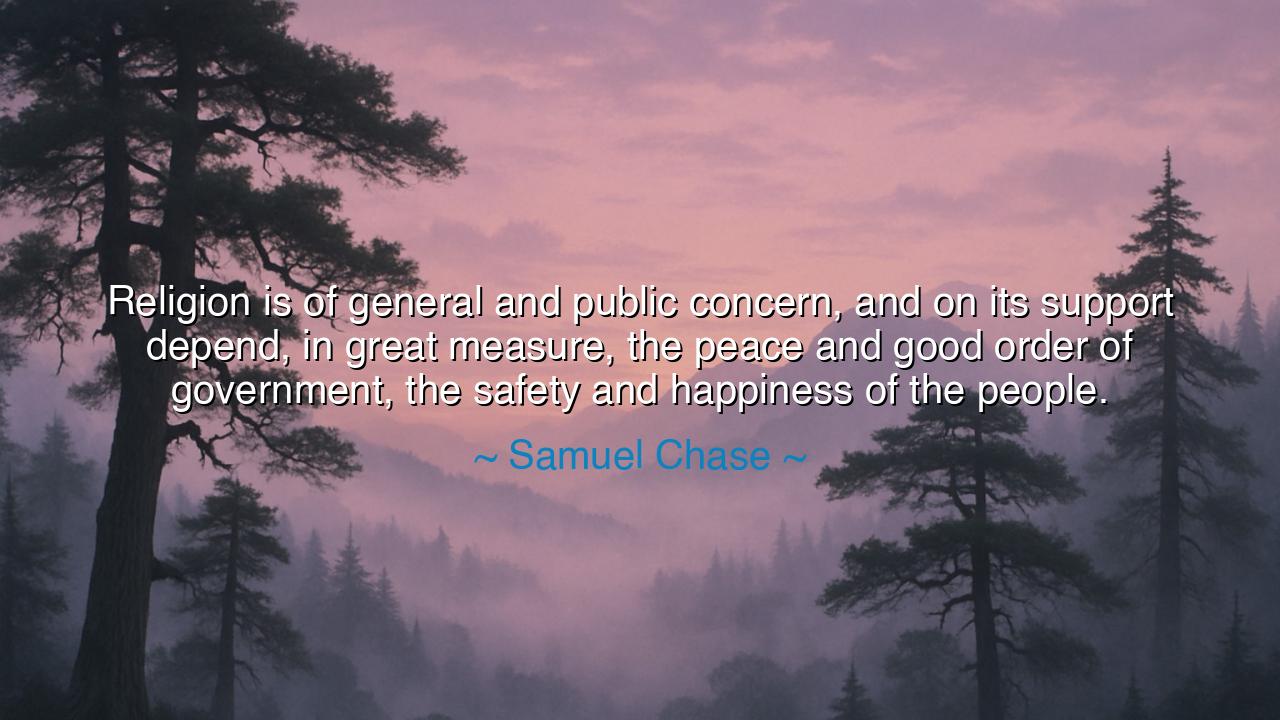
Religion is of general and public concern, and on its support
Religion is of general and public concern, and on its support depend, in great measure, the peace and good order of government, the safety and happiness of the people.






The words of Samuel Chase—“Religion is of general and public concern, and on its support depend, in great measure, the peace and good order of government, the safety and happiness of the people”—resound like the voice of an ancient lawgiver, calling a nation to remember the divine roots of its moral strength. Though spoken in the infancy of the American Republic, these words carry the weight of timeless wisdom: that faith, in its truest and most universal form, is not merely a private comfort but the foundation of public virtue. In them lies the understanding that civilization is not upheld by laws alone, but by the invisible threads of conscience that bind the hearts of people to what is just and good.
Samuel Chase, one of the signers of the Declaration of Independence and a Justice of the United States Supreme Court, lived in an age when the birth of freedom demanded both courage and restraint. He and his contemporaries knew well the fragility of liberty without moral order. They had seen nations rise in the name of reason and crumble in the fire of corruption. For them, religion was not the domination of church over state, but the moral compass that guided the state’s hand. Chase’s words do not call for dogma but for principle—for the reverence of a higher law that gives meaning to human law.
To the ancients, this truth was self-evident. Solon of Athens, when he forged the first democratic laws, began by invoking the gods, for he knew that laws without virtue were like ships without anchors. Cicero, the Roman orator, wrote that “true law is right reason in agreement with nature, unchanging and everlasting.” What he meant was that justice must be grounded in something eternal—something beyond the shifting winds of human desire. Chase, speaking in the new world centuries later, echoed this same wisdom: that without the moral restraint born of faith, freedom would decay into license, and liberty would devour itself.
We need only look to history to see the proof. When the French Revolution cast aside religion in the name of pure reason, chaos soon followed. The temples of faith were replaced by the altars of ideology, and the streets ran with blood. The people had sought to destroy superstition, but in doing so, they destroyed the moral foundation that held their society together. The Revolution’s leaders learned too late what Samuel Chase understood well: that peace and order depend not only on power but on principle, not only on justice enforced, but on virtue inspired.
Yet, Chase’s words do not belong only to the past—they speak also to our present age. For though the temples may change and the creeds may differ, every nation stands in need of moral light. The “safety and happiness of the people” cannot endure where truth is relative, where greed reigns, and where reverence for the sacred is forgotten. When people cease to believe in anything higher than themselves, government becomes a contest of appetites, and freedom, once a gift, becomes a burden. The ancients would say that such a people has lost its soul.
But hear this well: Chase does not call for faith to rule, but for faith to illumine. He reminds us that the support of religion—that is, the cultivation of virtue, the practice of gratitude, the acknowledgment of the divine order—is the surest safeguard of liberty. A moral people does not need chains; an immoral one cannot live without them. The lesson is as eternal as it is urgent: that freedom without virtue is a sword without a handle—it cuts even the one who wields it.
So, dear listener, let us take this teaching as a torch for our own time. Whether one’s faith is in God, in truth, or in the goodness of humanity, let it be a living faith—one that teaches compassion, justice, and humility. Seek not to impose belief, but to live it; not to argue over the form of the divine, but to practice the spirit of it. For in a people who honor conscience, there will be peace; and in a nation that nurtures virtue, there will be endurance.
Thus, the wisdom of Samuel Chase endures: that the strength of a government lies not merely in its armies or its laws, but in the soul of its citizens. Where the sacred is remembered, peace abides. Where faith in goodness is alive, the world remains safe and happy. And where the heart forgets the divine, even empires fall. Therefore, uphold what is sacred—not in fear, but in reverence—for in that reverence lies the eternal balance between freedom and order, between power and grace, between the will of man and the wisdom of heaven.






AAdministratorAdministrator
Welcome, honored guests. Please leave a comment, we will respond soon